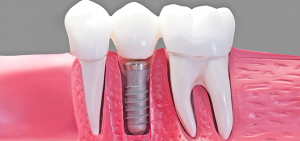How Does a Dental Implant Work?
 How Does a Dental Implant Work?
How Does a Dental Implant Work?
With regular dental care and some luck, you may never be a candidate for a dental implant, but knowing about them ahead of time will help inform your decision should the need ever arise. So, what are implants, how do they work, and who needs them?
Dental implants are artificial tooth “roots” that are placed into the jaw to help hold a replacement tooth, bridge, or even dentures, in place in the jaw. Typically made of Titanium, which the jawbone will accept or fuse to, dental implants are most often used for patients who have somehow lost a tooth or teeth – whether through accident, injury, or even periodontal disease. Implants can also help stop periodontal disease from forming by eliminating gaps in the mouth where disease and infection are likely to occur, and preventing the shifting of teeth which can cause more long-term damage.
There are two types of implants. “Endosteal,” or “in the bone” implants are typically screws, blades, or cylinders which are surgically placed directly into the jawbone. Generally used to support bridges or removable dentures, this type of implant is the most common. “Subperiosteal,” or “on the bone” implants are placed on top of the jaw with posts that protrude through the gum to hold a dental prosthesis in place. These types of implants are used for patients who are unable to wear conventional dentures. Sometimes an implant is used to anchor orthodontia in place as well.
An ideal implant candidate is usually in good health overall, and has good oral health as well. If you should need an implant, your dentist will likely refer you to an Endodontist, Oral Surgeon, or Periodontist, a professional who specializes in gum tissue and bone in the mouth, to make sure that you have the best care team in place. Healing time varies, as do success rates – and general post-surgical care is a key component to success. Learning about what’s involved in an implant will help you in making your decision should the need ever arise for you or your child.










